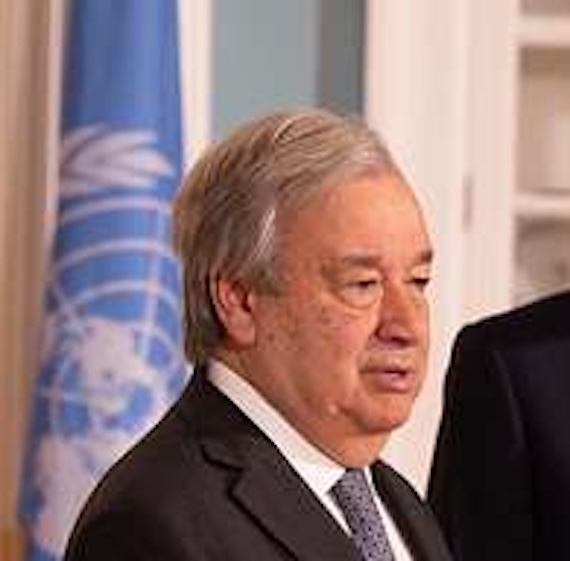( IMEMC ) – UN Secretary-General António Guterres stated Friday that the search for food in Gaza must never amount to a death sentence, underscoring the deepening humanitarian catastrophe in the besieged and devastated Gaza Strip.
On Friday, Day 102 since the resumption of the genocide in Gaza on March 18 (when Israel broke the ceasefire after just 53 days), the Israeli army continued bombing and shelling various areas across the devastated, starved, and besieged coastal enclave, killing 74 Palestinians, including 13 people shot while trying to obtain aid from the US mercenary company “GHF”.
Guterres issued a stark warning on Friday, declaring that the search for food in Gaza must “never become a death sentence,” as civilians continue to endure relentless bombardment, starvation, and displacement in the besieged enclave.
Speaking ahead of the Fourth International Conference on Financing for Development in Seville, Guterres condemned Israel’s continued obstruction of humanitarian access, asserting: “As the occupying power, Israel is obligated under international law to approve and facilitate the delivery of humanitarian aid.”
The @UN Charter is not optional.
It is the bedrock of international relations.
We cannot & must not normalize violations of its most basic principles.
Now more than ever, we must respect & re-commit to international law — in words & deeds.#CharterDay pic.twitter.com/tO5qQLQsz1
— António Guterres (@antonioguterres) June 26, 2025
He described Gaza’s humanitarian collapse in grim detail. “Families have been displaced over and over again. Now confined to less than one-fifth of Gaza’s territory, even these small remaining areas are under siege. Tents are bombed; civilians are killed in the act of simply trying to feed their families.”
Highlighting the catastrophic impact of Israel’s three-month blockade on essential supplies, Guterres noted: “Shelter materials and fuel remain banned. Doctors must decide who receives the final vial of medicine or the last ventilator. Humanitarian workers are starving. This cannot be normalized.”
He revealed that a small shipment of UN medical aid had crossed into Gaza earlier in the week, the first in months” saying it only underscored the vastness of the crisis. “A trickle of assistance is wholly insufficient. What Gaza needs is a deluge.”
Guterres also rejected recent attempts to reroute aid through militarized areas, calling such efforts inherently dangerous: “Guiding desperate civilians toward areas of combat is not humanitarian relief, it is a fatal miscalculation.”
He urged the international community to back the UN’s existing humanitarian framework, which he said is anchored in principles of humanity, neutrality, independence, and impartiality.
“We have the logistics. We have the experience. The trust of communities, donors, and member states is with us. Our plan worked during the last ceasefire; it must be allowed to function again.”
Concluding his remarks, Guterres called on Israel to comply with the UN Charter and ensure immediate, unhindered access to humanitarian aid.
He reiterated that a lasting solution to the crisis lies in a political path forward: “Diplomacy and human dignity must prevail. The only road to peace is the road to a two-state solution.”
Speaking at a press conference in New York ahead of his departure to Seville for the Fourth International Conference on Financing for Development, co-hosted by the UN and Spain, Guterres emphasized that “Israel, as the occupying power, is obligated under international law to approve and facilitate humanitarian relief.”
He described the dire conditions facing Palestinians: “Families have been displaced repeatedly and are now confined to less than one-fifth of Gaza’s territory. Even though these shrinking spaces are under threat, bombs are falling on tents, on families, on those with nowhere left to flee. People are being killed simply for trying to feed themselves and their loved ones.”
Guterres condemned Israel’s ongoing blockade, which for the past three months has barred the entry of shelter materials and fuel for essential services.
“Doctors are forced to choose who receives the last vial of medicine or the final ventilator. Aid workers themselves are starving. This situation cannot be normalized,” he said.
He noted that only a small shipment of medical supplies, “the first from the UN in months” had entered Gaza earlier this week, highlighting the scale of the crisis. “A trickle of aid is not enough. What Gaza needs now is a surge. That trickle must become an ocean.”
Guterres stressed the need for “concrete action to ensure aid reaches all people, swiftly and at scale, wherever they are.” He warned that “any operation that funnels desperate civilians into militarized zones is inherently unsafe; it is killing people.”
He rejected improvised and dangerous aid schemes, stating: “There is no need to reinvent the wheel. We have the solution.”
The Secretary-General outlined the UN’s detailed humanitarian plan, grounded in the principles of humanity, impartiality, neutrality, and independence.

File. Secretary Blinken meets with UN Secretary-General Antonio Guterres at the Department of State on April 27, 2023. [State Department Photo by Chuck Kennedy/Public Domain]. Via Picryl.
“We have the supplies. We have the expertise. Our plan is guided by the needs of the people and built on the trust of local communities, donors, and member states. It worked during the last ceasefire, and it must be allowed to work again.”
Guterres concluded by urging Israel to uphold the UN Charter, allow humanitarian access, and enable aid to reach civilians wherever they are. He reaffirmed that “the only path to peace is through a two-state solution,” ending with a call for “diplomacy and human dignity to prevail for all.”
Via IMEMC
Licensed under a Creative Commons Attr-NonCom 4.0 International License..

 © 2026 All Rights Reserved
© 2026 All Rights Reserved